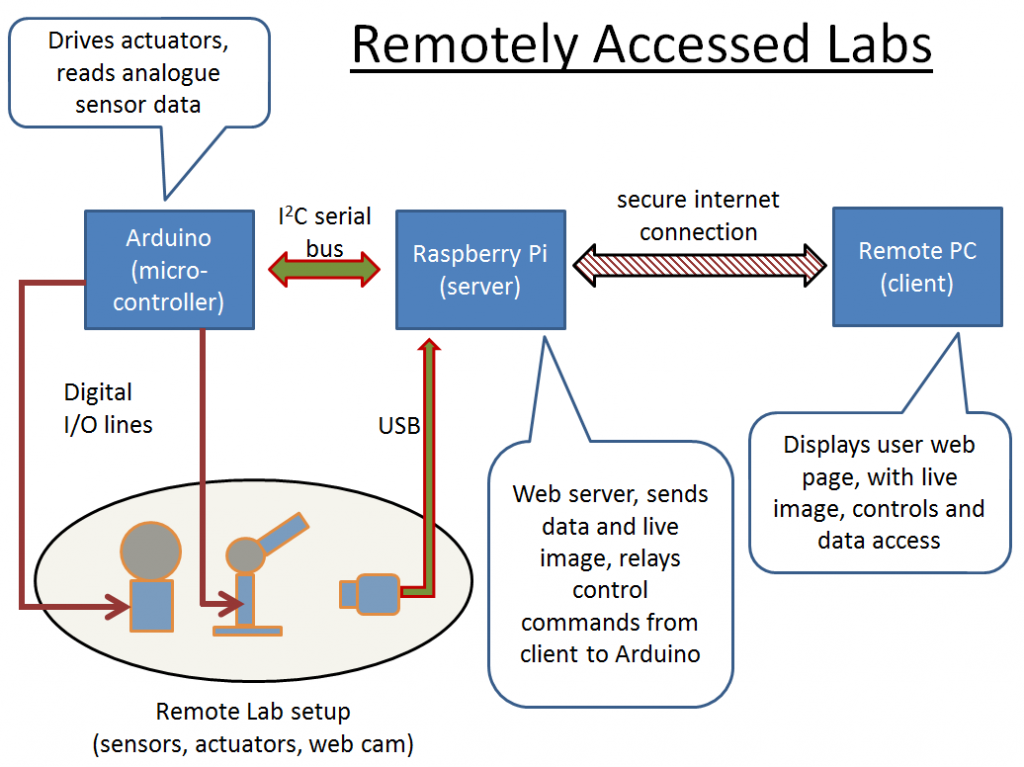Remotely Accessed Laboratory Suite (RALS) using the Internet of Things
In this series of posts, we’re looking at how the projects from the 2016 Teaching Innovation Award are developing. In this post, Dr David Kerr and Dr Anthony Sutton, Wolfson School of Mechanical, Electrical and Manufacturing Engineering, reflect on their project progress and plans for the future.
Aims
To create a suite of equipment and an integrated software framework that enables the quick and easy design and implementation of remotely accessed laboratories based on Internet of Things technology. The suite will be designed to provide a flexible and scalable development platform for laboratory-based course material.
Objectives
- Develop a suit of hardware devices with sufficient flexibility to work with a range of typical sensors and actuators used in science and engineering labs
- Integrate these with a mobile and scalable software library that will operate on a range of platforms currently used within the science and engineering field (e.g. Matlab, LabVIEW)
- Provide a suitable web dashboard for students to interact with the system and carry out their experiments
- Involve stakeholders (technical and academic staff and students) within the Wolfson School and if required, the School of Science, in order to capture a wide range of technical and pedagogic essential and desirable criteria for the system design
Progress so far
Hardware concept – we are concentrating on a modular design concept, to allow a high degree of flexibility and to increase ease of use. Modules will cater for a range of peripheral devices such as actuators, motors, switches, sensors and cameras for real-time vision. The diagram below shows the main hardware layout.
The core of the system is the Raspberry Pi model 3, which acts as a webserver host and controller for the lab. Peripherals are addressed via an I2C serial bus, where Arduino/Genuino architecture is used to interface sensors, motors, actuators and relay switches. The Raspberry Pi also hosts the camera module. The Pi/Arduino architecture was a deliberate choice in view of its wide availability, low cost and ease of maintenance. Furthermore, the necessary software is either part of the Free Software Foundation (FSF) or has a Creative Commons license, and the hardware details are in the public domain.
Software and GUI
We are developing the web dashboard and server software in Python, using the Flask web development environment. All the software is FSF or public domain and there is an excellent developmental community, with an expected long future ahead of it. During the summer of 2016 we dedicated the initial design task to a bursary student for EESE, who constructed a successful prototype and interfaced this to our modular hardware. We decided this approach was preferable to tying in to an existing IoT provider such as ThingSpeak, where GUI development is limited and reliance on a third party could become complex and costly.
We want eventually to build in access to existing local coursework setting and marking systems such a Learn and CASPA. Thus students using the on-line lab could submit their work on line and receive feedback and marks automatically within a realistic time frame.
Pilot lab for demonstration
We are continuing with the development of an exemplar on-line lab for Part B Mechanical Engineering students. This is in progress as a Part C undergraduate project in the Wolfson School. The lab is currently used in conventional form in our first year Fluid Mechanics module MMA800. The demonstrator should be available in a working form by the start of the summer term 2017. Given sufficient time, we plan to try out the remote version of this lab with student volunteers who have already experienced the conventional exercise, and obtain their feedback.
This exercise has proved invaluable in helping to scope out concepts for commonly used interface modules. We intend these to be easy to use by those not familiar with the background hardware and make them in effect “plug-and-play” as far as possible.
User engagement
We intend actively to seek engagement with staff and other potential stakeholders such as Lab Technicians as well as students. A second Part C project is therefore underway to study and collate best practice from a review of existing remote laboratories used in the international FE and HE sectors. We plan to use a small scale survey of academic staff within the Wolfson School to ascertain possible take-up of this technology in the future. The results of the survey will form part of our final deliverables, and inform the final design concepts of our modular system.
To make the system more flexible, we will be looking at ways of building in access to the hardware via more popular engineering software suits such as Matlab and LabVIEW. Matlab is particularly attractive in that it provides excellent data analysis tools with built-in access to the Raspberry Pi and Arduino hardware platforms we are using in the project.
